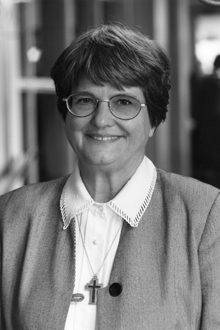
Sister Helen Prejean, an anti-death penalty activist and author whose legal and religious arguments against "state-sanctioned executions" have sparked international dialogue, spoke at Emory's Oxford College campus on Sept. 18 about her life's work.
Prejean began her prison ministry in 1981, when she dedicated her life to the poor of New Orleans. She went on to become a spiritual adviser to Patrick Sonnier, a death-row inmate at Louisiana's Angola State Prison. After witnessing his execution, she wrote "Dead Man Walking: An Eyewitness Account of the Death Penalty in the United States," which has been adapted into an award-winning film, a play and an opera.
She has since served as spiritual adviser to several death-row inmates and has accompanied six people to their executions.
Her visit was hosted by Oxford Chaplain Lyn Pace and sponsored by Oxford College's Pierce Institute for Leadership and Community Engagement.
While visiting Emory's Aquinas Center of Theology, Prejean sat down with Emory Report to discuss her work and spiritual life:
What message are you bringing to the Emory community?
Well, it's about spiritual life as waking up and reaching out and taking responsibility. So I'm going to be sharing my own faith journey and waking up to the Gospel of Justice. Not just simply being charitable to people — being nice, being kind — but of justice and addressing some of the huge issues of the day.
I'm also going to be talking about the Catholic journey in the development of opposition to the death penalty. There's been a real development within the Catholic Church. Last November, Pope Benedict called upon Catholics to work against the death penalty. He said to organize and engage in the political legislative process to end the death penalty. So that was good; we'd been waiting for that.
A year ago this week, Troy Davis was executed in Georgia for the 1989 murder of an off-duty police officer, despite recanted testimony from several witnesses. What lessons are to be taken from that?
Georgia is a killing state, where people don't blink an eye about executing criminals. In my second book, "The Death of Innocents," I talk about how there are all these constitutional protections that people on trial for their life are supposed to have — and then look what happened to Troy. He had all these witnesses who recanted, and yet (his case) couldn't find traction in the courts because you had these procedural bars that come up like treadles. Basically, what the court said was that even with evidence of possible innocence, you have to make (a case) so strong or we'll not even give you a hearing in federal court. And that's what happened to Troy. He got killed through the legalisms of the court.
What do you find to be your most powerful tools of persuasion?
There's intellectual argument — you have to have empirical information, you've got to give people facts. So many think, "Oh, it deters crime" — no, it doesn't — "It's less expensive than life in prison" — no it isn't. But when it's woven into story, that's the most powerful way, because it's whole. It touches intellect, but it also touches emotions and helps people work through to the heart.
You have been on this journey for over 30 years. What evidence do you have that it's making a difference?
You can see the difference in the diminishment of practice of the death penalty in the United States. Each year, for the past five years, another state has abolished the death penalty.
I'm about to go to California, where they have a ballot initiative (Prop. 34) coming up on Nov. 6. The campaign emphasizes that all states are under a budget crunch. And it's enormously expensive to kill — a lot of people don't know that. In California, they have over 700 people on death row right now. The average time it can take before an execution is over 20 years. A fiscal analysis (2011) recently showed that it cost California over $4 billion to execute 13 people (since the death penalty was reinstated). Just bringing that to the people saying, "What else could you do with that money — in terms of community policing, working with at-risk kids, halfway houses when people get out of prison so that they can become citizens again." The internal polls show that people are getting it.
Capital punishment is a polarizing issue, and at times your work must feel like an uphill battle. What sustains you?
Gandhi said it and Martin Luther King, Jr. said it: "It's the integrity of it." Anybody who has had the experience I've had, of accompanying a human being and watching them be killed in front of your eyes, and it's all legal and a lot of the times with religion to back it up — there's a chaplain putting his little blessing on it — I tell you, it sears your soul. It's a fire.
As a spiritual adviser to death-row inmates, you have an intimacy with this topic that few will ever know. What has that taught you, what has it given you?
The question is what have they given me. Because the way we can kill people is to present an image of them that they're not human. And I've been given the privilege to accompany people — some who were really guilty and have done terrible crimes. But it's taught me, and it keeps teaching me, that everyone is worth more than the worst thing they've ever done in their life.
